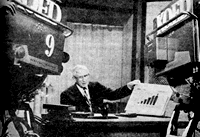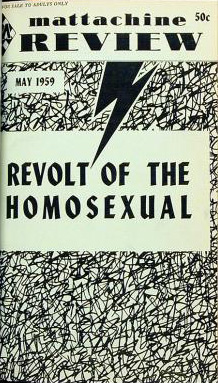
The Mattachine Society, founded in 1950, was an early national gay rights organization in the United States, preceded by several covert and open organizations, such as Chicago's Society for Human Rights. Communist and labor activist Harry Hay formed the group with a collection of male friends in Los Angeles to protect and improve the rights of gay men. Branches formed in other cities, and by 1961 the Society had splintered into regional groups.

The Daughters of Bilitis, also called the DOB or the Daughters, was the first lesbian civil and political rights organization in the United States. The organization, formed in San Francisco in 1955, was initially conceived as a secret social club, an alternative to lesbian bars, which were subject to raids and police harassment.
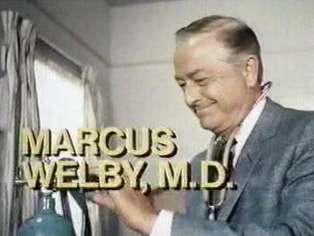
Marcus Welby, M.D. is an American medical drama television series that aired on ABC from September 23, 1969, to May 4, 1976. It starred Robert Young as the title character, a family practitioner with a kind bedside manner, who made house calls and was on a first-name basis with many of his patients; James Brolin as his partner Steven Kiley, a younger doctor; and Elena Verdugo as Consuelo Lopez, Welby and Kiley's dedicated and caring nurse/office manager.

That Certain Summer is a 1972 American made-for-television drama film directed by Lamont Johnson. The teleplay by Richard Levinson and William Link was considered the first sympathetic depiction of gay people on American television. Produced by Universal Television, it was broadcast as an ABC Movie of the Week on November 1, 1972, and received a number of television awards and nominations. The movie was also recognized as being the first network drama to depict a stable, same-sex couple; the first to depict a gay parent; and the first gay themed show to win an Emmy, with Scott Jacoby winning for his performance. A novelization of the film written by Burton Wohl was published by Bantam Books.
This is a list of notable events in the history of LGBT rights that took place in the 1960s.
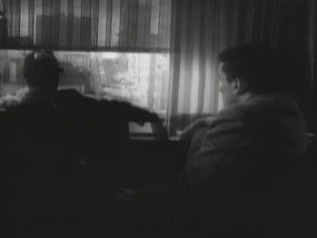
"The Homosexuals" is a 1967 episode of the documentary television series CBS Reports. The hour-long broadcast featured a discussion of a number of topics related to homosexuality and homosexuals. Mike Wallace anchored the episode, which aired on March 7, 1967. Although this was the first network documentary dealing with the topic of homosexuality, it was not the first televised in the United States. That was The Rejected, produced and aired in 1961 on KQED, a public television station in San Francisco.
"Gay Power, Gay Politics" is a 1980 episode of the American documentary television series CBS Reports. It was anchored by Harry Reasoner with reportage by George Crile. Crile also produced the episode with co-producer Grace Diekhaus. He conceived the show after becoming aware of the 1979 National March on Washington for Lesbian and Gay Rights and took as his focus the 1979 San Francisco mayoral election. After intermittent shooting over several months in 1979 with the cooperation of prominent members of the city's LGBT community, CBS aired "Gay Power, Gay Politics" on April 26, 1980.
"Steve Burdick" is an episode of the 1990 NBC television series Lifestories, an anthology drama that each week followed a new set of characters dealing with a medical issue. The episode revolves around Burdick, a gay television newsman with AIDS. When his lover dies of the disease, Burdick reveals his own diagnosis on the air to the displeasure of his station manager. The episode was loosely based on Paul Wynne, a newscaster out of San Francisco who died of AIDS in 1990.
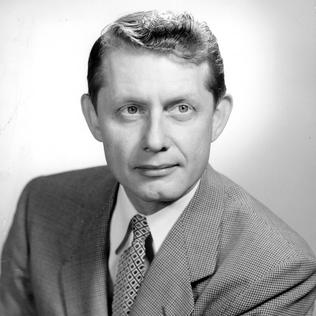
Harold Leland "Hal" Call was an American businessperson, LGBT rights activist, and U.S. Army veteran. He served as president of the Mattachine Society and in the 1950s, was one of the first gay activists to speak publicly on television. Call founded printing presses for LGBT publications and later opened gay adult shops and pornographic film screening venues. He received a Purple Heart for his service in the Pacific War.
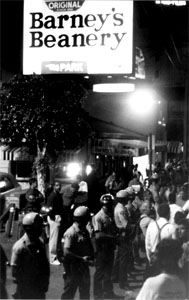
A zap is a form of political direct action that came into use in the 1970s in the United States. Popularized by the early gay liberation group Gay Activists Alliance, a zap was a raucous public demonstration designed to embarrass a public figure or celebrity while calling the attention of both gays and straights to issues of gay rights.
"The Outrage" is a 1974 episode of Marcus Welby, M.D., a long-running American medical drama on ABC. The episode tells the story of a teenage boy who is raped by his male teacher. The episode, which originally aired October 8, 1974, sparked controversy and anger for its equation of homosexuality to pedophilia. "The Outrage" was targeted for protests by LGBT rights groups and several network affiliates refused to broadcast it.
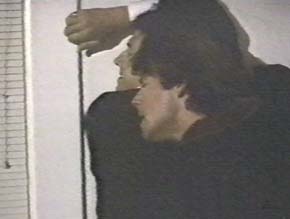
"After It Happened" is a 1988 episode of the NBC television series Midnight Caller. The controversial episode tells the story of a bisexual man who is deliberately infecting people with HIV, including series lead character Jack Killian's ex-girlfriend. Activists for HIV/AIDS awareness and LGBT rights disrupted filming, citing concerns over the negative portrayal of bisexual and HIV-positive people and fears that the show would make people with AIDS the targets of violence. Series executives made some changes to the script in response to these concerns, but activists were still displeased.

"Flowers of Evil" is a 1974 episode of the American police procedural television series Police Woman. The episode features Sgt. Suzanne "Pepper" Anderson going undercover at a nursing home to investigate a murder. She uncovers a trio of lesbians who are robbing and murdering their elderly residents. The episode, the eighth of the first season, originally aired on November 8, 1974.

Jodie Dallas is a fictional character from the 1977 American sitcom Soap. He was played by Billy Crystal. The son of central character Mary Campbell, Jodie works as a television commercial director. Jodie was among the first gay characters on American television. Despite being gay, Jodie fathered a child through a one-night stand, and many of his storylines throughout the series centered on his involvement with women. Jodie had relationships with two other women but maintained throughout the series that he was still gay. The series ended with Jodie, as the result of hypnotherapy, believing he was an elderly Jewish man.
"The Boys in the Bar" is the sixteenth episode of the first season of the American situation comedy television series Cheers. It originally aired on January 27, 1983, on NBC in the continental U.S. and on February 10, 1983 in Alaska. It is co-written by Ken Levine and David Isaacs and directed by James Burrows. This episode's narrative deals with homosexuality, coming out, and homophobia. It was inspired by the coming out story of former Los Angeles Dodgers baseball player, Glenn Burke. In this episode, Sam's former teammate, Tom—portrayed by Alan Autry—reveals his homosexuality and Sam slowly becomes supportive of him. The bar's regular customers express their disdain toward Sam's support and fear that because of Sam's support of Tom, the bar will become a place full of homosexuals. The episode's Nielsen ratings at its initial airing were low but improved after subsequent airings on NBC. This episode has received more attention since.
